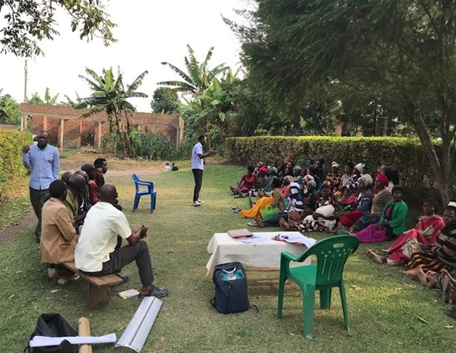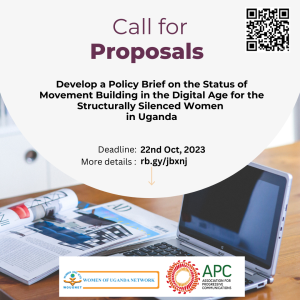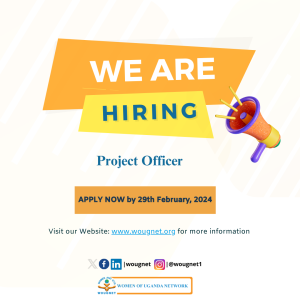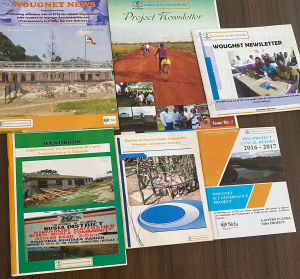A significant portion of the Ugandan population relies on agriculture as their primary source of income, encompassing both those with advanced education and those without. The cultivation of both staple and cash crops serves as the foundation for livelihoods, achieved through the sale of agricultural goods and labor on farms in exchange for wages.
Therefore, with the aim of positively influencing and enhancing livelihoods through agriculture, WOUGNET is implementing the PATHS Project in the Rwenzori Region that primarily targets farmer groups in the area. This initiative is being funded by HUMUNDI and it is being implemented in partnership with Joint Effort to Save the Environment, KRC UGANDA and The Association of Rwenzori Community (RCA). The main goal of the five (5) year project is to increase smallholder farmers’ knowledge on how they can effectively use Information and Communication Technologies (ICTs) such as phones and radios to promote agroecology and create sustainable food systems in the region. The project also places emphasis on exploring how local farmers in the area can improve their agricultural planning and production strategies by incorporating gender issues/concerns within their farmer groups. This is being implemented in the three project districts of Kabarole, Kamwenge and Kyenjojo, all located in the Rwenzori sub region of Uganda.
The primary focus of the project is to engage farmer groups that include both men and women, equipping them with extensive knowledge and skills to effectively address a wide array of challenges in the agricultural sector. These challenges span from gender related concerns within farming, and household dynamics to leadership roles in public spheres among others. These will not only foster and improve production but also promote sustainable development in farmers’ households leading to improved livelihoods of communities in the region.
Addressing Gender gaps in the Sector.
As a fundamental principle at WOUGNET, we prioritize gender awareness as a central objective during project implementation. Additionally, we have a principle of involving a higher proportion of women compared to men (in the ratio of 70% women to 30%men), and this is being reflected in the project. Having conducted an evidenced based research study and interacted with numerous farmers in the region, primarily in the target area during our baseline study and through training(s) on gender and stereotypes in the sector, we discovered that there are still significant gender gaps in the agricultural sector. Too many stereotypes still exist, as evidenced by the fact that certain regions continue to see men and women engaging in separate crop cultivation practices. This affects production and sustainability of certain crops in case the person who has been monopolizing the production is not available or unable to work due to unavoidable circumstances. Under this project, we intend to address these stereotypes, especially through gender training(s) to point out the causes and possible solutions to the target beneficiaries.
Marketing of farm produce through use of ICTs.
Another issue faced by our farmers is production without market access or use of middlemen because their labor is undervalued and abused. As an organization that focuses on the use of ICTs as a way of improving livelihoods of communities, we shall train these farmers on the best ways to utilize the available ICTs accessible to them for services like market accessibility, market prices and also be able to access advice from agricultural specialists regarding their work. This will be accomplished through the development of a mobile and web-based application and other platforms designed and customized in such a way that they serve all farmer’s needs inclusively.
Project Implementation.
In alignment with the saying “two minds are more effective than one,” WOUGNET has formed a collaborative alliance with three other partners in the region. This collective effort is geared towards enhancing our capacity to serve farmers more effectively. The project concept has been embraced by the farmers we have engaged with thus far. They are happy to embark on this remarkable journey as we continue with the project implementation.
Initial dialogues have already taken place with the 20 groups identified for the initial phase of collaboration. With a significant majority of these groups being composed of women (accounting for more than 60% of the total). Our objective is to directly empower over 600 farmers and indirectly impact the lives of more than 1000 farmers in the region. This is because once we empower the women who are mainly in the agricultural sector (both small scale and large scale), we shall have strengthened the back bone of the sector hence its growth.
In this regard, we have already embarked on the capacity building of our farmers to enhance their competency on gender. As we all know, gender is one factor that has been overlooked over the years in many sectors despite the fact that it has diverse effects on every aspect of the economy (it cannot be ignored or eliminated). We started by highlighting the gender inequalities in agriculture in this region, their causes, and the best ways to address them, keeping in mind that the best approach to treat an illness is to find its diagnosis. This includes, but is not limited to, reviewing some customary practices in the sector and overcoming the barriers to development like a certain gender not growing certain crops or doing some work on the farm. For example, women can also start taking part in growing cash crops like coffee, cocoa, vanilla, tea and cotton which have been grown by mostly men in the region. More so, men and women can start working together on the gardens to share ideas on the farm and produce together instead of doing it as individuals. This does not only aid them develop together but also unify them as a family and improve production.

Mitomi Vision Coffee farmers group during their gender training at their meeting point in Karangura S/C – Kabarole District.
In addition to gender training, a variety of activities are to be done to ensure that farmers receive the required information and support that they need. These activities include but are not limited to, farmers’ groups ICT trainings, radio talk shows, farmer school visits, running jingles on local radios and developing knowledge products for easy learning among others.
Conclusion.
In addition to increasing food production in this region, addressing important gender issues in the agricultural sector and assisting our farmers in developing alternative methods of accessing services to aid in production and marketing such as the use of ICTs, this intervention will also promote family unity, sustainable development and production, as well as increase food security and incomes for all small-holder farmers.
Written by: Ainamani Arnold K
Project Officer, PATHS






